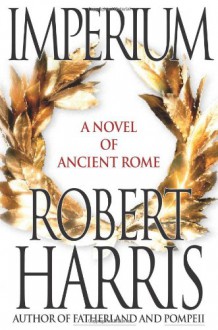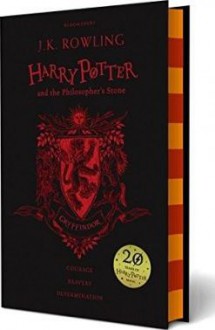A big thank you to Moonlight Reader for yet another fun, inventive BookLikes game! I had a wonderful time, while also advancing -- though with decidedly fewer new reads than I'd origianlly been planning -- my two main reading goals for this year (classic crime fiction and books written by women).

Harry Potter - The Complete Series
This was a long-overdue revisit and obviously, there isn't anything I could possibly say about the books that hasn't been said a million times before by others. But I've gladly let the magic of Hogwarts and Harry's world capture me all over again ... to the point of giving in to book fandom far enough to treat myself to the gorgeous hardcover book set released in 2014 and, in addition, the even more gorgeous Gryffindor and Ravenclaw anniversary editions of Harry Potter and the Philosopher's Stone.




That said, particular kudos must also go to Stephen Fry for his magnificent audio narration of the books, which played a huge role in pulling me right back into to books, to the point that I'd carry my phone wherever I went while I was listening to them.







As for the rest of my KYD books ... roughly in the order in which I read them:

Ngaio Marsh: Death at the Dolphin (aka Killer Dolphin)


Also a revisit: One of my favorite installments in Marsh's Roderick Alleyn series, not only because it is set in the world of the theatre -- always one of Marsh's particular fortes, as she herself was a veteran Shakespearean director and considered that her primary occupation, while writing mysteries to her was merely a sideline -- but because this one, in fact, does deal with a(n alleged) Shakespearean relic and a play based on Shakespeare's life, inspired by that relic.


Freeman Wills Crofts:
The Hog's Back Mystery
Part of Crofts's Inspector French series and my first book by Crofts, who was known for his painstaking attempts to "play fair" with the reader; which here, I'm afraid, hampered the development of the story a bit, in producing a fair bit of dialogue at the beginning that might have been better summed up from the third person narrator's point of view in the interest of easing along the flow of the story, and in holding French back even at points where a reasonably alert reader would have developed suspicions calling for a particular turn of the investigation. But I like French as a character, and as for all I'm hearing this is very likely not the series's strongest installment, I'll happily give another book a try later.
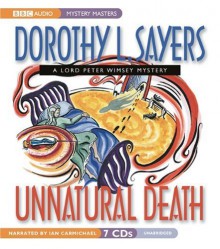

Dorothy L. Sayers: Unnatural Death
Not my favorite Lord Peter Wimsey book by Sayers, but virtually the only one I haven't revisited on audio recently -- and as always, I greatly enjoyed the narration by Ian Carmichael. That said, here again Sayers proves herself head and shoulders above her contemporaries, in devising a particularly fiendish, virtually untraceable method of murder (well, untraceable by the medical state of the art of her day at least), and perhaps even more so by hinting fairly obviously at two women's living together in what would seem to be a lesbian relationship.


Margaret Drabble: The Red Queen
Ummm ... decidedly NOT my favorite read of the month. 'Nuff said: next!


Walter Mosley: A Red Death
I'd long been wanting to return to the world of Easy Rawlins' mid-20th century Los Angeles, so what with Mosley's fiction making for various entries in the KYD cards, including at least one book by him in my reading plans for the game seemed only fitting (... even if I ended up using this one for a "Dr. Watson" victim guess!). -- This, the second installment of the series, deals with the political hysteria brought about by the McCarthy probes and also makes a number of pertinent points on racial discrimination and xenophobia, which make it decidedly uncomfortable reading in today's political climate.


Agatha Christie: One, Two, Buckle My Shoe
Another revisit, and in no small part courtesy of Hugh Fraser's narration, I liked the book a good deal better than I had done originally. This is one of several entries in the Poirot canon where we learn about Poirot's phobia of dentist's visits, which obviously makes for the high point of the book's humour ... and of course it doesn't exactly help that it's Poirot's dentist, of all people, who turns out the murder victim. -- The plot features several clever slights of hand, and you have to play a really long shot to get the solution right in its entirety (even if strictly speaking Christie does play fair). Well, that's what we have Monsieur Poirot's little grey cells for, I suppose!
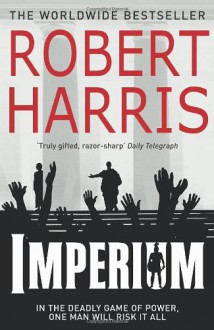

Robert Harris: Imperium
The first part of Harris's Cicero trilogy, and both a truly fast-paced and a well-researched piece of historical writing; covering Cicero's ascent from young Senator to Praetorian and, eventually (and against all the odds), Consul.
The first part of the book deals at length with one of Cicero's most famous legal cases, the prosecution of the corrupt Sicilian governor Verres, and Harris shows how Cicero employed that case in order to advance his own political career. Notably, Cicero quite ingeniously also ignored established Roman trial practice in favor of what would very much resemble modern common law practice, by making a (by the standards of the day) comparatively short opening statement -- albeit a supremely argumentative one -- and immediately thereafter examining his witnesses, instead of, as procedural custom would have dictated, engaging in a lengthy battle of speeches with defending counsel first. As a result of this manoeuver, Verres was as good as convicted and fled from Rome in the space of the 9 days allotted to Cicero as prosecuting counsel to make his case.
The second part of the book examines Cicero's unlikely but eventually victorious campaign for consulship, and his exposure of a conspiracy involving Catiline, generally believed to be the most likely victor of that year's consular elections, who later came to be involved of conspiracies on an even greater scale, and whose condemnation in Cicero's most famous speeches -- collectively known as In Catilinam (On, or Against Catiline) -- would go a great way towards securing both Cicero's political success in his own lifetime and his lasting fame as a skilled orator.


Agatha Christie: Murder Is Easy
Another Christie revisit, and I regret to say for the most part I'm down to my less favorite books now. This isn't a bad book, and the ending in particular is quite dark ... but the middle part, much as I'm sorry to have to say this, simply drags.


Val McDermid: The Distant Echo
Holy moly, how did I ever miss this book until now?! Even more so since the Karen Pirie series is actually my favorite series by Val McDermid ... OK, Pirie herself has little more than a walk-on role here; we're talking absolute beginning of her career, and the focus is decidedly not on her but on her boss and on a quartet of suspects involved in a 25-year-old murder case -- in fact, the whole first half of the book is set 25 years in the past, too, describing the immediate aftermath of the murder and its consequences for the four main suspects, chiefly from their perspective. But still! Well, I sure am glad I finally caught up with it at last ... definitely one of the best things McDermid ever wrote.


Juli Zeh: Unterleuten
A scathing satire on village life, on post-Berlin Wall German society, on greed, on the commercialization of ideals ... and most of all, on people's inability to communicate: Everyone in this book essentially lives inside their own head, and in a world created only from the bits they themselves want to see -- with predictably disastrous consequences. The whole thing is brilliantly observed and deftly written; yet, the lack of characters that I found I could like or empathize with began to grate after a while ... in a shorter book I might not have minded quite so much, but in a 600+ page brick I'd have needed a few more characters who actually spoke to me to get all the way through and still be raving with enthusiasm. If you don't mind watching a bunch of thoroughly dislikeable people self-destruct in slow motion, though, you're bound to have a lot of fun with this book.
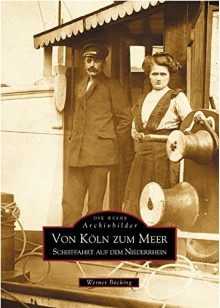

Werner Böcking: Von Köln zum Meer
Local history, a read inspired by conversations with a visiting friend on the history of shipping and travel by boat on the Rhine. -- A richly illustrated book focusing chiefly on the 19th and 20th centuries, and the mid-19th-centuriy changes brought about by diesel engines and the resulting disappearance of sailing vessels (which, before the advent of engines, were pulled by horses when going up the river, against the current): undoubtedly the biggest change not only in land but also in river travel and transportation, with a profound effect on large sectors of the economy of the adjoining regions and communities.
And last but not least ...


Dennis McCarthy & June Schlueter: "A Brief Discourse of Rebellion and Rebels" by George North -- A Newly Uncovered Manuscript Source for Shakespeare's Plays
The lastest in Shakespearean research, also a read inspired by conversations with the above-mentioned visiting friend, and a February 7, 2018 New York Times article on a possible new source text for passages contained in no less than 11 of Shakespeare's plays. The story of the discovery itself is fascinating; the research methods applied are in synch with modern Shakesperean scholarship ... and yet, for all the astonishing textual concordance, unless and until someone proves that Shakespeare not only had the opportunity to see this document but actually did (at least: overwhelmingly likely) see it, I'm not going to cry "hooray" just yet. According to the authors' own timeline, Shakespeare would have been about 11 years old when this text was written, it was kept in a private collection even then, and there is no record that the Bard ever visited the manor housing that very collection -- which collection in turn, if the authors are to be believed, the text very likely at least did not ever leave during Shakespeare's lifetime (though it was undoubtedly moved at a later point in time). And Shakespearean research, as we all know, has been prone to a boatload of dead-end streets and conspiracy theories pretty much ever since its inception ...


 Log in with Facebook
Log in with Facebook 
